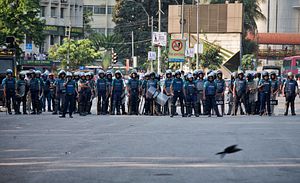“It was 3 in the morning when they came,” 21-year-old Jiaul recounted. “I was shaken awake by my uncle who shouted – They’re taking your father away! Come out!”
But there was nothing Jiaul or his mother and little sister could do. His father could barely put on a shirt before he was dragged away by Mirpur Model Police Station’s subinspector Bajlur Rahman and his team of around seven officers.
What transpired in the week following the pre-dawn raid on 44-year-old Mozammel Hoque Chowdhary’s modest house in Narayanganj, Bangladesh, is a dark yet typical example of what is rapidly becoming normal in Bangladesh’s politics. It’s yet another story of how civil rights activists across the country are declared criminals and pre-emptively locked up while the criminal justice system hunts for suitable crimes to put against their name. It’s also a story of how the Awami League-led ruling alliance has swung from massive popularity to unhinged paranoia.
Chowdhary is the general secretary of the Jatri Kalyan Samity – a group advocating rights for passengers of public transportation. For the 12 years that Chowdhary has been with the organization, neither he nor his NGO has had any participation in politics or partisan affiliation of any significance. According to their own records, the most militant of their activities has been conducting awareness campaigns regarding traffic laws.
And yet, for a country that claims to be battling terrorism, drug cartels, and sedition plots, Bangladesh’s government has spared no effort in arresting and extending the remand of this most benign of civic campaigners.





























